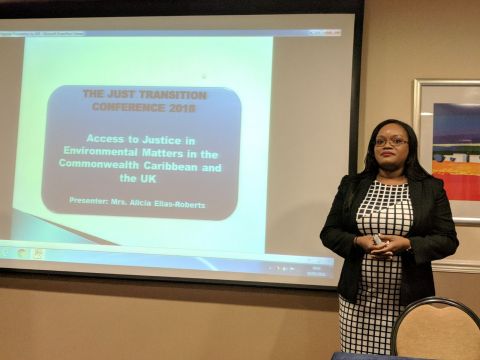
In the fall of 2016, PhD candidate Alicia Elias-Roberts became the first recipient of the Robert Sutherland Fellowship in Law, established in 2015 to honour Jamaican Robert Sutherland, Queen’s first Black graduate (1852) and British North America’s first Black lawyer.
In her fellowship’s second year, Elias-Roberts’ research has not only been enlightening but has drastically broadened her outlook on the problems she set out to address: the West Indies’ inconsistent maritime oil and gas laws that stand in the way of a greener Caribbean, future prosperity and good global citizenship.
Her research began with reading all the relevant literature so that she could start thinking outside the box and considering other sides of the arguments she intends to make.
“It has been a challenging year,” she says. “I thought it would be easier, given my background, but studying at Queen’s has opened my eyes to fresh perspectives.”
The background she refers to includes graduating from the University of Guyana at the top of her LLB class and earning a Certificate in Legislative Drafting from a program Guyana offers in collaboration with the Commonwealth Secretariat. She also holds a BCL from Oxford University and an LLM in Energy, Environment and Natural Resource Law from the University of Houston.
That past is prologue to everything she set out to do in 2016. “The central themes of my thesis are still there,” she says, “but the legal and philosophical angles have changed. You might say I am now drilling far deeper below the surface level – examining the issue of offshore energy development from a broader theoretical and philosophical perspective.
“My main argument is that the relative normativity of international environmental law principles promotes weakness in the international legal order, so I will assess the problems surrounding the changing nature of sovereignty and its application to various environmental law problems. Then I hope to argue that a possible solution to those problems in offshore hydrocarbon projects is to conceptualize them under the liberal theory of international law. I will interrogate the application of communitarian values and global environmental governance in the West Indies and show why their application is flawed and incapable of resolving the Caribbean’s complex problems.”
Elias-Roberts is grateful for the encouragement of her supervisor, Professor Bruce Pardy, an internationally renowned environmental law expert and the reason she chose Queen’s Law. “Besides being so accessible and helpful,” she says, “he gets me to challenge what I thought I knew.” He also encouraged her to publish chapters of her dissertation. One that ran in the International Energy Law Review uses the 2013 Venezuela-Guyana land dispute and two related case studies to discuss the legal implications arising when a state that lays claim to a disputed maritime area grants oil companies permits to explore in that area.
Elias-Roberts says, “I’m working hard to challenge the existing literature and get people thinking about global governance. It’s a live issue that sustains my interest and keeps me energized. That’s why my advice to other PhD prospects would also be to choose a subject that’s timely, serious, and of great personal interest. Also, think about how doctoral work will add value to you and to the world as a whole. Then pace yourself and plan.”
Despite having a lot on her plate, Elias-Roberts remains Deputy Dean of Outreach at the University of the West Indies, St. Augustine Campus, and still finds time to “conduct outreach” for her new community whenever she can. Balancing work and study is challenging, “but I want to market myself and the Queen’s brand,” she says, “because I feel so blessed to be in this position.”
Part of that “outreach” took her to Scotland as an invited keynote speaker at the Just Transition 2018 Conference in Edinburgh March 1-2 – “The Just Transition towards a Low-Carbon Economy: Integrating Climate, Energy and Environmental Justice.” Her address related to her new PhD study: “Access to Justice in Environmental Matters in the Commonwealth Caribbean and the UK.”
In July she’ll be back in Scotland, this time in Glasgow, presenting at the International Union for the Conservation of Nature’s Academy of Environmental Law Colloquium. Her topic this time: “A comparative analysis of risk assessment and environmental challenges relating to offshore energy projects.”
She was also recently part of a team that provided training to the Guyana Judiciary and Bar Association on matters related to Oil and Gas law.
As she said, this first Sutherland Fellow is indeed “drilling far deeper below the surface.”
— Aschille Clarke-Mendes